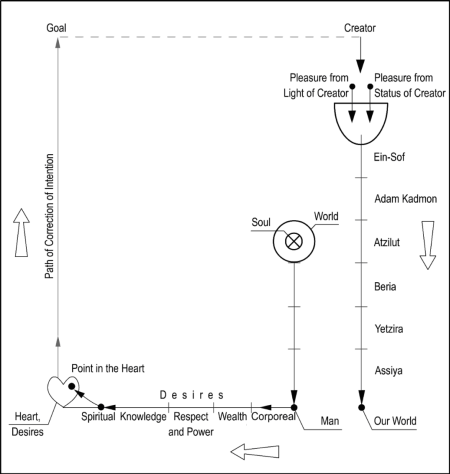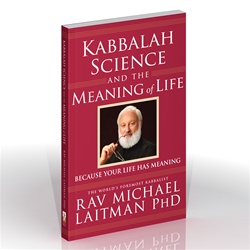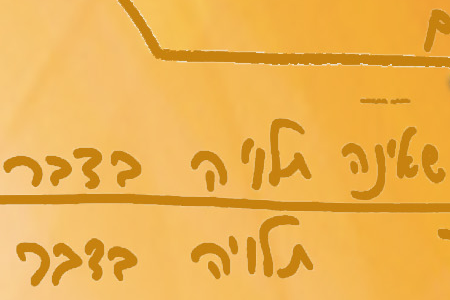The Root of Why a Person Eventually Desires to Want to be Like the Creator
The wisdom of Kabbalah explains that the matter of creation is the desire to receive, and this desire goes through a four phase development, reaching the last phase where it develops it’s own independent desire for the Creator’s status on top of its original fulfillment.
In this last state, the creature receives pleasure from sharing the Creator’s status, and indulges in it. Thus, the creature indulges in two pleasures: the pleasure that comes from the Creator, and the pleasure that comes from sharing the Creator’s status. This state of being is called Ein Sof (No End), and refers to a state where there are no limitations on the desire.
This does not refer to distance, time or space in the physical sense. Rather, this is an observation that pertains to the nature of the desire, meaning that the desire itself is unlimited.
Upon receiving these pleasures, the creature finds once more that there is a source of the pleasure. It discovers that the Giver is the source of the pleasure, and feels itself as the receiver. This time the sensation is valid because the will to receive in this state is the creature’s own, not one that came to it from the Creator.
Consequently, the creature feels that it wants to escape its own desire. It shuns it, and does not want to belong to its own desire any longer. The rejection that it feels toward its own desire induces it to “restrict” it (avoid using it). The desire is still there, but now the creature refrains from using it. Hence, the sensation of fulfillment—the pleasure—ceases.
Have You Ever Wondered How the Soul Comes to Be?
Having remained with a craving, the creature resolves to reach the status of the Creator, the only status that the creature now wishes to have—that of the Giver. It senses that it must give to the Creator without receiving any reward for itself. From this point onward, all its actions will be aimed solely to attain this goal.
To reach this objective, the creature executes a complex series of operations: It builds a chain of concealments (coverings) on the Upper Light, called “worlds” (the Hebrew word for “world” is Olam, which stems from the word Haalama, concealment). At the bottom of the chain of worlds stands “this world.” Because the process that created the creature was comprised of five parts, the lessening of the Upper Light occurs through five degrees of concealment, five worlds whose names are Adam Kadmon, Atzilut, Beria, Yetzira, and Assiya.
In the process of constructing these worlds, the creature builds a surrounding environment for itself. In the world Atzilut, the will to receive is split in two: an inner part—soul–and an outer part—environment (surroundings), in which the soul operates. This stage still does not pertain to our world.
As a result of later events, the soul and its environment will experience a process of shattering, and consequently decline several degrees down to the degree of “this world.” Only now begins the formulation of the matter that makes up our world.
How Spirituality Relates to Our World
From this stage onwards, from the broken will to receive, begins the historic evolution of the material world we are familiar with. Once the universe has been created, the still (inanimate), vegetative, and the animate degrees are made, and following them, the speaking (human) degree is formed (Figure 5).

At its preliminary evolutionary stage, humanity has physical desires for sustenance, reproduction, and family. The body always has these elementary needs to sustain itself; we would need them even if we lived alone on an island.
The second stage in our evolution features a growing desire for wealth, followed by a desire for power and respect. These drives for wealth, power, and respect are considered “social desires,” thus called for two reasons:
A) We absorb these desires from our social environment. Had we lived alone, we would not want them.
B) These desires can only be realized within a social framework.
The final evolutionary stage is the craving for knowledge and erudition. We want more and more knowledge, and want to know and research everything–hence the evolution of science.
Today, as we are nearing the conclusion of this evolution, which has taken us thousands of years, we are beginning to realize that it really did not yield anything. We find ourselves in a unique situation: we want to be filled with pleasures, but can’t find around us any sources of true pleasure. Additionally, we cannot accurately define what it is we want. Thus, we find ourselves perplexed and disoriented, like lost children, not knowing which way to turn. Although we want something, we don’t know what it is or where to find it.
Why a Person Awakens to Want Spirituality
We assign the word, “heart,” to the sum of desires that have evolved in us through our life cycles: physical desires, social desires, and the desire for knowledge. Opposite these desires stands “the point in the heart,” a “speck” of a new desire that evolves above all other desires. In fact, the point in the heart is the awakening desire to know the Upper Force, and it is the awakening of this desire that brings one to the wisdom of Kabbalah as a means to realize this desire.
The awakening of the point in the heart brings confusion, a by-product of this point’s origins in the Upper World. The laws of the Upper World pertain to a reality where time, space, and motion do not apply.
Naturally, our brains are arranged so that we always think in terms of time, space, and motion. But in this new stage, we begin to feel that what determines everything is how we personally sense reality, and that reality in and of itself is unchanging.
Thus, we gradually come to sense that reality is static and that time, space, and motion don’t really exist at all. We begin to realize that all our past experiences happened only within our sensations, that everything depends on how much we have cultivated our abilities to sense.
We need time to adjust to the concept that nothing changes except the measure by which we open our “tools of sensation.” When we have done that, we will begin to sense the world we live in very naturally, simply, without any limitations, preconceptions, rules, oppression, coercion, or exterior pressures.
The point in the heart is the beginning of the desire for spirituality. Today, relatively few people are at this stage, but their numbers are increasing all the time. Eventually, every human being must come to the point where a craving for the Creator is uppermost, a point initiated by the above-mentioned envy, meaning the inherent need in every creature to reach the status of the Creator.
Kabbalah: The Manual for How to Reach the Creator
We must understand that when we said that the Creator is good, we meant that the Creator created us with the intention of bringing us to the best possible state of being, i.e. the Creator’s own state. Hence, this is the state to which we must be brought. Any lesser state than this one will therefore not be considered adequate. It follows that the purpose of Creation is to allow us to reach the status of the Creator.
In order to reach the level of the Creator, however, we must come to feel that our desire is totally opposite that of the Creator, that the Creator wants only to give, and that we want only to receive. This is the emptiness and darkness of the Kli (vessel) as opposed to the Light. Acknowledging this oppositeness builds us as creatures. For us to know the Creator, we must first know the opposite state from his, the “anti-Creator,” a state of unbearable torments that poses a big question mark about our ability to endure these torments.
It is fair to say that we haven’t yet begun the process of knowing the anti-Creator. To feel our complete oppositeness from the Creator, we will have to emotionally decline to much lower degrees. The wisdom of Kabbalah is surfacing now because it is impossible to experience these states physically, and Kabbalah is a means of easing our way through the states of oppositeness from the Creator, to experience them in our consciousness and our minds, not in our bodies.
We can compare this process to a person in pain. That person can either wait until the pain becomes intolerable and then turn to a physician, or turn to the doctor as soon as the pain appears. In the latter case, early diagnosis of the problem will spare one the suffering that comes with the actual breakout of the disease. In other words, a clever person takes medication as soon as symptoms of an illness appear, thus preventing its onset.
By so doing, one can evolve consciously, through reasoning, and thus the Kli (creature) learns to become aware of its oppositeness from the Light. The wisdom of Kabbalah is a method that helps us evolve through knowledge instead of through pain, and it is appearing today to allow humankind to acknowledge the evil that lies in egoism before it fully manifests itself, inflicting horrendous ruin in all aspects of life.
Hence, the wisdom of Kabbalah as the means to achieve both our evolution and the purpose of Creation should reach all of humanity. The more people engage in Kabbalah, and the more we circulate it throughout the world, the better off we will all be.
 “Here Is a Method that Is Helping People Attain Spirituality in This Life” is based on the book, Kabbalah, Science and the Meaning of Life by Dr. Michael Laitman.
“Here Is a Method that Is Helping People Attain Spirituality in This Life” is based on the book, Kabbalah, Science and the Meaning of Life by Dr. Michael Laitman.

